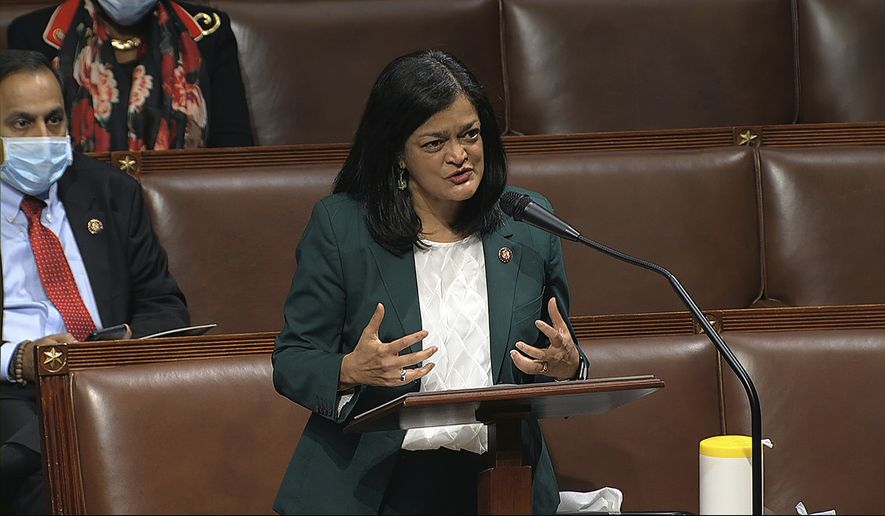Top Democrats are getting antsy over President Biden’s continued negotiations with GOP senators on infrastructure, and they are urging the White House to abandon the talks and move forward on a strictly partisan basis.
The pressure is coming from Congress’ progressives who warn that Mr. Biden is either wasting time negotiating with Republicans or will give away too much to forge a bipartisan compromise.
“People across America delivered Democrats a clear mandate for transformative change,” said Democratic Rep. Pramila Jayapal of Washington, the chairwoman of the Congressional Progressive Caucus. “Now, we must use this historic governing opportunity to go big, bold, and fast to deliver for them.”
Ms. Jayapal and her allies demand that Democratic congressional leaders move ahead without Republicans and force an infrastructure package through the Senate using a process known as budget reconciliation.
The process circumvents the 60-vote threshold that most bills must clear to survive. It allows some spending bills to pass via a simple majority vote in the Senate, which is currently split 50-50 between the parties with Vice President Kamala Harris as the tie-breaking vote.
“We urge our colleagues in Congress to pursue a larger up-front investment that truly meets this historic moment,” Ms. Jayapal and 60 of her colleagues wrote in a letter to House Speaker Nancy Pelosi and Senate Majority Leader Charles E. Schumer. “While bipartisan support is welcome, the pursuit of Republican votes cannot come at the expense of limiting the scope of popular investments.”
The jitters among rank-and-file Democrats emerged amid Mr. Biden’s ongoing talks with Republicans. To date, the talks have made only minor progress.
Republicans initially scoffed at Mr. Biden’s $2.25 trillion price tag, arguing the sum was extravagant in light of the massive debt racked from coronavirus relief spending.
Last month, the Senate GOP unveiled a $568 billion infrastructure proposal that they called “fiscally responsible.” It directed funding explicitly at fixing the nation’s roads and bridges instead of the social welfare and climate change programs included in the Biden plan.
“I think it’s important for you all to realize this is the largest infrastructure investment that Republicans have come forward with,” said Republican Sen. Shelley Moore Capito of West Virginia, the proposal’s author. “This is a robust package when we look at where we’re focusing our infrastructure needs.”
Since then, Republicans have upped their spending threshold to $800 billion. GOP lawmakers also appear willing to compromise on some of Mr. Biden’s green energy ambitions, including providing money for electric vehicle charging stations.
“I don’t think we’re at the explicit offer stage yet,” said Sen. Roy Blunt of Missouri, one of the GOP negotiators. “We’re still in the talking stage.”
Even though negotiations are ongoing, a significant gap between Democrats and Republicans exists on the meaning of infrastructure.
Mr. Biden’s $2.25 trillion package focuses heavily on what Democrats calls “human infrastructure,” like job retraining for felons and more public housing.
Only $612 billion of the president’s proposal goes to fixing roads and bridges. The same plan, meanwhile, calls for more than $400 billion for elderly care, $12 billion to provide training for felons and $213 billion for public housing.
Republicans, say an infrastructure proposal that does not explicitly focus on the nation’s transportation systems cannot generate bipartisan support.
“I’m looking for things that I consider infrastructure, that are hard infrastructure core infrastructure, physical infrastructure, and I leave out all of the things that I believe are not infrastructure,” said Sen. John Barrasso, Wyoming Republican.
There are also significant divisions between the two sides on how to pay for any new spending. Mr. Biden has called for the package to be paid through hikes in corporate and income taxes to pay for the package. Republicans say any tax increases are unacceptable.
Given the differences, progressives fear that Mr. Biden will concede too much in an attempt to broker a bipartisan deal.
“Human infrastructure cannot be secondary to the physical infrastructure needs or languish under Republican obstructionism,” Ms. Jayapal said.
The White House did not respond to requests for comment on this story.
Despite the desire of progressives to go it alone, it is unclear if the White House has the votes to move forward with reconciliation.
Democrats narrowly control Congress, with their hold on the Senate especially tenuous. Within the chamber split 50-50, Democrats need unanimity to bypass Republicans
That political reality leaves Mr. Biden with no wiggle. He would either need all 50 members of his party to stand together or at least some cross-over support of Republicans.
Both scenarios are uncertain. Moderate Democrats, including Sens. Joe Manchin III of West Virginia and Kyrsten Sinema of Arizona, have signaled an unwillingness to force through a big infrastructure spending bill. Republicans, on the other hand, are unlikely to support Mr. Biden’s package if it includes the tax increases that the president wants to use to pay for it.
“I don’t think Republicans are going to sign up to raise taxes,” said Republican Sen. Mitt Romney of Utah, a key moderate in the chamber.
• Haris Alic can be reached at halic@washingtontimes.com.




Please read our comment policy before commenting.